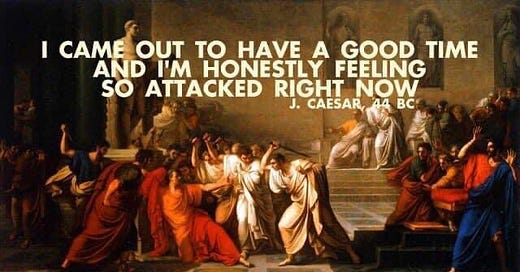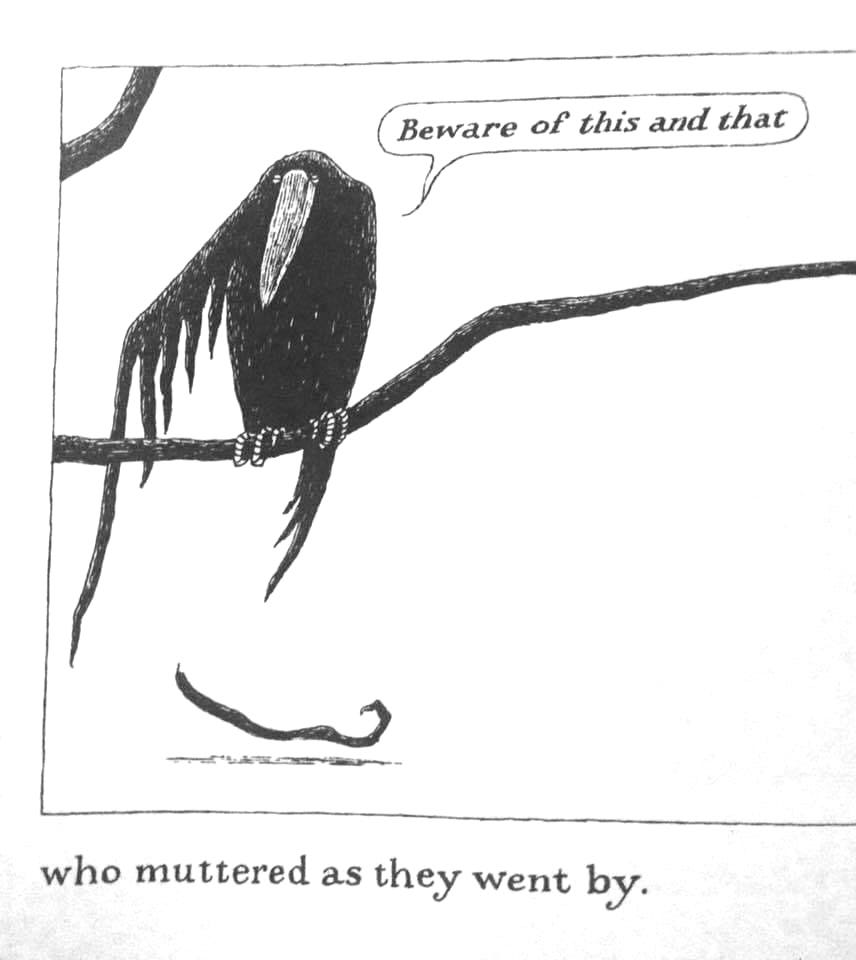Beware the Ides of March.
~Soothsayer, Julius Caesar
Now, there are Ides in every month. This is something most of us forget, because of long-lasting pop culture and one playwright’s dramatization of a historical event. No, really—there’s Ides in the middle of every month, just as there are Kalends at the beginning and Nones at the end, too. But those other times of the month we’ve ignored since ancient Roman times, and other Ides in other months aren’t regarded with the same dread as are the March ones, since the Bard wrote Julius Caesar, with its Soothsayer echoing down the centuries to make us, today in 2024, regard the Ides of March as a Friday the 13th of sorts; an unlucky day to be careful around (and of course to make Caesar-stabbing memes about too).
But historians largely agree that Caesar’s assassination didn’t probably occur on March 15th, nor could it have been at the consul steps, nor was Brutus the main betrayer and mastermind of the thing, either.* But, thanks to William Shakespeare: just as we all regard Richard III as a hunchbacked villain & a bottled spider, we remember the Ides of March as the day Caesar went down because of his hubris. Because of his ambition. Or so said Brutus. And Brutus is an honorable man. But I’m getting ahead of myself.
*I consulted a few sources for my introductory Ides info, including history.com, the online Encyclopedia Britannica, Wikipedia, and the Old Farmer’s Almanac.
So what better thing to write about today, on the Ides of March, than the play that made the day? There’s plenty of cool stuff in Ceasar to potentially talk about, but I wanted to compare these two (very famous) speeches from Act III and tell you why they’re so fricking brilliant and why Shakespeare was such a genius when it comes to nailing human nature. So I want to share each speech one at a time, and discuss each, then I’ll wrap up why these two happening one after the other is SO GOOD… ahem. Scuse me.
BUT! Before I begin, I would very much recommend, as your friendly neighborhood English and also Theatre professor, that you find someplace where you can see/hear these speeches performed first. Preferably by somebody good, like the RSC. Shakespeare’s work was never meant to be read silently, so I find it’s essentially important to hear it performed. Go find that and meet me back here. I’ll wait.
Let me quickly explain the scenario of these two speeches too, before we begin. No, I’m not going to summarize the play up till now, that’s not my job. Go watch it or read it or get the SparkNotes. Basically though: Julius Caesar has just been assassinated: murdered in a betrayal by a bunch of court guys, Brutus being the main guy in charge of the conspiracy and act. Antony is, or rather was, Caesar’s right hand man. These speeches occur at Caesar’s funeral. Let’s look at them in order of appearance:
1 Brutus
Romans, countrymen, and lovers! hear me for my
cause, and be silent, that you may hear: believe me
for mine honour, and have respect to mine honour, that
you may believe: censure me in your wisdom, and
awake your senses, that you may the better judge.
If there be any in this assembly, any dear friend of
Caesar's, to him I say, that Brutus' love to Caesar
was no less than his. If then that friend demand
why Brutus rose against Caesar, this is my answer:
--Not that I loved Caesar less, but that I loved
Rome more. Had you rather Caesar were living and
die all slaves, than that Caesar were dead, to live
all free men? As Caesar loved me, I weep for him;
as he was fortunate, I rejoice at it; as he was
valiant, I honour him: but, as he was ambitious, I
slew him. There is tears for his love; joy for his
fortune; honour for his valour; and death for his
ambition. Who is here so base that would be a
bondman? If any, speak; for him have I offended.
Who is here so rude that would not be a Roman? If
any, speak; for him have I offended. Who is here so
vile that will not love his country? If any, speak;
for him have I offended. I pause for a reply.
ALL
None, Brutus, none.
BRUTUS
Then none have I offended. I have done no more to
Caesar than you shall do to Brutus. The question of
his death is enrolled in the Capitol; his glory not
extenuated, wherein he was worthy, nor his offences
enforced, for which he suffered death.
Here comes his body, mourned by Mark Antony: who,
though he had no hand in his death, shall receive
the benefit of his dying, a place in the
commonwealth; as which of you shall not? With this
I depart—that, as I slew my best lover for the
good of Rome, I have the same dagger for myself,
when it shall please my country to need my death.
After this, of course, the crowd extols, “Live, Brutus, live!” and etc. which it’s easy to see from the structure of this speech, Brutus expects. He’s less mourning Caesar’s death than explaining his murder.
I could do a whole hour long lecture on each of these speeches alone, but I’ll stick to the salient points: I want you to look at how Brutus persuades the crowd to be on his side, using manipulation in the form of what I call the Cool Kids Club argument.
Brutus establishes his intellectual superiority early on, even as he asks for the rabble to use their ‘wisdom’ to judge him after they’ve heard. He goes to a greater-good argument in the first part, when he declares that he didn’t ‘love Caesar less,’ but that he ‘loved Rome more.’ This is pricking the crowd to question their patriotism—I loved Rome so much, he’s saying, that I killed this man I loved in order to save it from his ambition. This is where he then goes into the Cool Kids Club litany: he lists a bunch of types of people who would be offended by this act, and questions each: wanna be a bondsman (slave)? Well then I guess I’ve offended you. Anyone here so gross and ignorant that he doesn’t love his country and wants to be a good true Roman? If you’re that messed up then I guess I’ve offended you, but I know none of you are that stupid or vile, right?
The fact that he gets them to agree that none of them are like that, shows how he’s gotten them into the palm of his hand. Oh well in that case, then, he says, you’re one of us. You’re a cool kid, like me. But hey, if you want, I’ve still got this knife—want me to use it on myself? (Spoiler alert! Ahem.) But by that point the crowd is all firmly on his side.
But then in comes Antony, and his speech actually begins with a few nameless crowd guys talking about how awesome Brutus was and oh look at Antony and is he crying? and he better not say anything bad against Brutus and wow yanno Brutus has a point, we’re glad Caesar’s dead and… Antony even tries to start his speech before his famous first lines, except the crowd is so taken with Brutus’ speech that’s come before that they’re distracted. That’s why Antony starts this way:
2 Antony
Friends, Romans, countrymen, lend me your ears;
I come to bury Caesar, not to praise him.
The evil that men do lives after them;
The good is oft interred with their bones;
So let it be with Caesar. The noble Brutus
Hath told you Caesar was ambitious:
If it were so, it was a grievous fault,
And grievously hath Caesar answer'd it.
Here, under leave of Brutus and the rest--
For Brutus is an honourable man;
So are they all, all honourable men--
Come I to speak in Caesar's funeral.
He was my friend, faithful and just to me:
But Brutus says he was ambitious;
And Brutus is an honourable man.
He hath brought many captives home to Rome
Whose ransoms did the general coffers fill:
Did this in Caesar seem ambitious?
When that the poor have cried, Caesar hath wept:
Ambition should be made of sterner stuff:
Yet Brutus says he was ambitious;
And Brutus is an honourable man.
You all did see that on the Lupercal
I thrice presented him a kingly crown,
Which he did thrice refuse: was this ambition?
Yet Brutus says he was ambitious;
And, sure, he is an honourable man.
I speak not to disprove what Brutus spoke,
But here I am to speak what I do know.
You all did love him once, not without cause:
What cause withholds you then, to mourn for him?
O judgment! thou art fled to brutish beasts,
And men have lost their reason. Bear with me;
My heart is in the coffin there with Caesar,
And I must pause till it come back to me.
[here, a few of the crowd speak and we can hear them pondering all this, being moved by seeing Antony’s tears, as well as reiterating that there’s ‘not a nobler man in Rome than Antony.’]
But yesterday the word of Caesar might
Have stood against the world; now lies he there.
And none so poor to do him reverence.
O masters, if I were disposed to stir
Your hearts and minds to mutiny and rage,
I should do Brutus wrong, and Cassius wrong,
Who, you all know, are honourable men:
I will not do them wrong; I rather choose
To wrong the dead, to wrong myself and you,
Than I will wrong such honourable men.
But here's a parchment with the seal of Caesar;
I found it in his closet, 'tis his will:
Let but the commons hear this testament--
Which, pardon me, I do not mean to read--
And they would go and kiss dead Caesar's wounds
And dip their napkins in his sacred blood,
Yea, beg a hair of him for memory,
And, dying, mention it within their wills,
Bequeathing it as a rich legacy
Unto their issue.
I won’t quote the whole rest of this scene, or this analysis will be too long, but what happens is: Antony takes a big cue from Caesar’s earlier thrice-rejecting the crown, till the crowd are begging him to become king. Antony does something similar, in that he repeatedly insists he won’t read the will, until he’s made to do so by the crowd. Then what he does is the coup-de-grace: he gets the crowd to surround Caesar’s body, and lowers himself physically to their level, to read the will.
But look at his speech and see how he’s done this already: where Brutus demanded the crowd appreciate his honor, Antony calls them ‘countrymen’ and asks only that they lend him their ears and listen to him mourn. He undermines Brutus by reverse-psychology, repeating over and over that he and his co-conspirators are ‘honorable men.’ He doesn’t question that, and keeps repeating that he’d never wrong them or trash talk them; they’re honorable men. But look at how he weaves in the questions: Oh, was Caesar ambitious? I’d never say Brutus was lying, but…
Antony puts himself there with the crowd, even before he physically does so, by asking for a pause while he’s overwhelmed with emotion, by his words and manner seeming more common (especially compared to haughty Brutus), and by reminding them they used to love Ceasar—what happened? Please explain to poor Antony; he’s overwhelmed with emotion and he doesn’t understand these fancy shmancy orators’ intricate arguments…
I don’t think Antony’s any less sincere or that his tears are any less faked than Brutus’ necessarily, but what he does so well here (and why he ‘wins’ this exchange) is that he nails his audience so well. He puts himself immediately right there with them, and, instead of appealing to their logic and mental understanding, he hits them in the gut feelings, and in the heart. He gets them in a lower chakra than Brutus does, in other words, and it works.
What else do you notice about these two speeches, especially in comparison to one another?
NOTE: I am appearing in the Covid Shakespeare Club’s reading of Julius Caesar tonight, 8pm Mountain Time, if you’d like to hear a bunch of very talented amateurs treat this play with some rollicking love, ask me and I’ll shoot ya the Zoom link. I get to play Casca, which I’m pretty psyched about.






Great post, Jenn.
Antony thinks of the crowd as a jury with power to decide. Brutus doesn't give them that agency.
Brutus's argument contains no evidence of Caesar's ambition. He just assumes they will believe him because he's Brutus and, as you say, the coolest kid.
Antony starts by casting doubt on the charge of ambition with "if" and then gives specific evidence of the lack of ambition.
J
Thanks for this deft exploration, which occurs at the unsteady border between drama, psychology and philosophy...apparently, Shakespeare was fine w/ that terrain. It prompted me to look up an earlier soliloquy by Brutus, in which he compares Caesar to a serpent's egg. Still looking for the best video deliveries of the Antony and Brutus speeches. Suggestions, anyone?